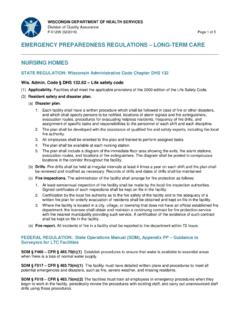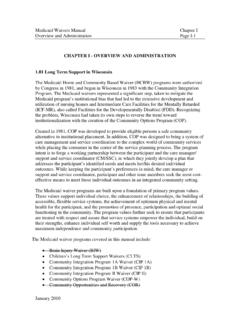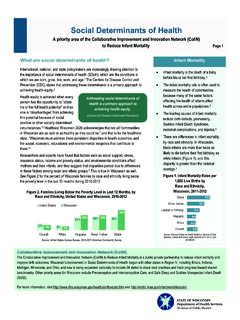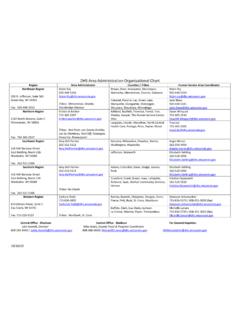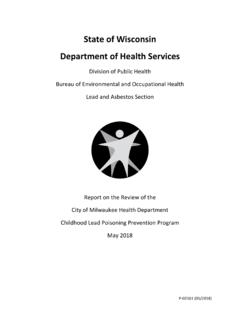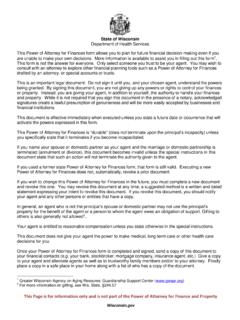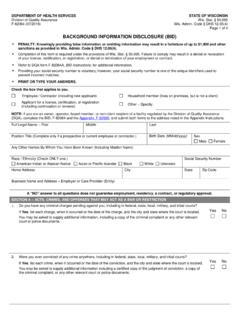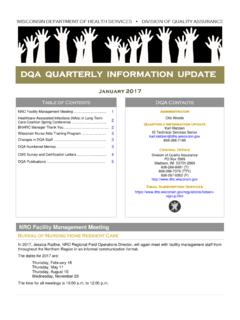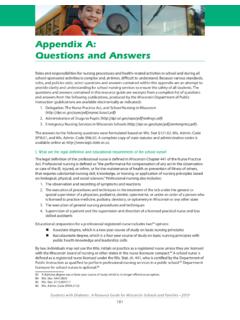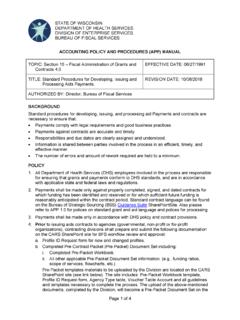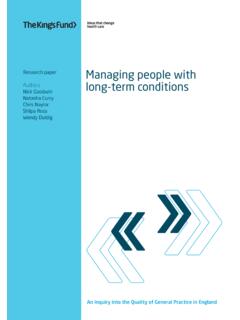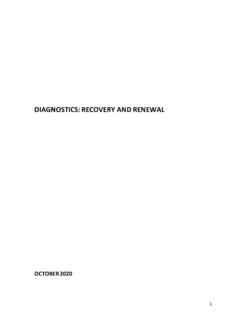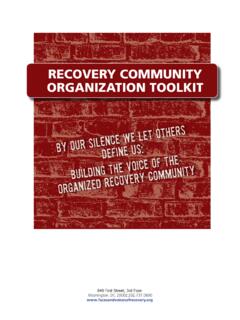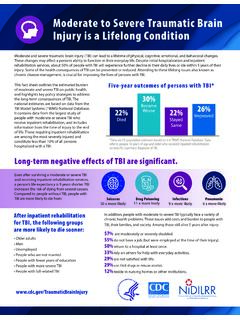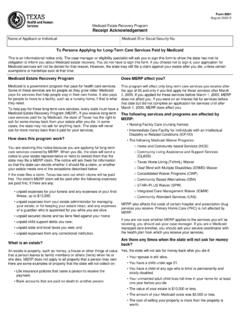Transcription of Wisconsin Estate Recovery Program Policy Changes Effective ...
1 What is the Estate Recovery Program ?The Wisconsin Estate Recovery Program seeks repayment for the cost of certain long term care services paid for on behalf of members by Medicaid, BadgerCare Plus, community Options Program (COP), or non-Medicaid Family Care; or any services provided by the Wisconsin Chronic Disease Program (WCDP). Recovery is made from the estates of members, from the estates of their surviving spouses, from certain non-probate property, and from liens placed on their homes.
2 Recovery is made when a member and the member s dependents no longer need those assets. Wisconsin spends approximately 50 percent of its total Medicaid budget to provide long term care services. The money recovered is returned to the programs and used to pay for care for other members. long term care services for which the Program seeks repayment include nursing home services, home care services and community -based long term care Program services. Note: Members who are age 55 or older, living in the community and who are not receiving services related to long term care or any services through the WCDP will not be affected by Estate is required by state and federal laws to recover some of the money used to pay for services for Medicaid members.
3 These laws are designed to recover from the assets of those who received benefits from the Medicaid Program . What is changing?Beginning August 1, 2014, due to Changes in state law certain new assets and services will now be part of the Estate Recovery Program . AssetsThese assets will now be part of the Estate Recovery Program : Joint Tenancy Property Repayment will be made after the member passes away from joint tenancies created on and after August 1, 2014.
4 Repayment will be made from the interest in the property the member has at the time the member passes away. TEFRA liens will continue to be filed on joint tenancy homes and repayment will be made from joint accounts at financial institutions, no matter when the joint tenancy was created. Life Estates Repayment will be made from a life tenant s interest in life estates that are created on and after August 1, 2014. Life Insurance Policies Repayment will be made from a member s life insurance Policy , no matter who is named as the beneficiary, for life insurance policies created on and after August 1, 2014.
5 Marital Property Repayment will be made from 50 percent of the surviving spouse s Estate . Revocable Trusts Repayment will be made after the member passes away from revocable trusts created on and after August 1, 2014. TEFRA liens will continue to be filed on homes in revocable trusts regardless of when the trust was created. Tax Equity and Fiscal Responsibility Act (TEFRA) Liens Repayment will be made through TEFRA liens placed on life estates that are created on and after August 1, 2014.
6 Other Non-Probate Property Repayment will be made from non-probate property not listed above for any member who passes away on or after August 1, 2014. These assets will be used as repayment for members who pass away on and after August 1, cost of these services will now be included in the amount that the Estate Recovery Program will seek repayment for: All Services Received While Participating in a long Term Care ProgramRepayment will be made for all services received on or after August 1, 2014 by a member age 55 years and older participating in a long term care Program .
7 This includes members participating in home and community -based waiver programs, and the Program of All-Inclusive Care for the Elderly (PACE). Capitation PaymentsRepayment will be made from the entire capitation payment made to a managed care organization (MCO) beginning August 1, 2014 for a member participating in a long term care of these services applies to services received and capitation payments made on or after August 1, 2014 for any member age 55 and older participating in a long term care Program .
8 long term care programs include all home and community -based programs and Estate Recovery ProgramPolicy Changes Effective August 1, 2014 Fact SheetWho do these Changes affect? All Wisconsin Chronic Disease Program members, Institutionalized members of any age enrolled in Medicaid or BadgerCare Plus, and Members age 55 years of age and older enrolled in Medicaid or BadgerCare members are members who have been, or are expected to be, inpatients in a hospital for 30 or more days, and who are required to pay their monthly income toward their cost of the Estate Recovery Program pursue repayment from estates for other Medicaid services besides long term care services?
9 No. Only services related to long term care are recovered from an Estate for do the Changes start?The Policy Changes will begin August 1, if my Estate is not able to repay Medicaid?The legal process known as probate settles an individual s solely owned property by distributing the Estate to creditors, heirs, and beneficiaries. Creditors file claims in estates to ensure payment of a debt owed them. By law, the Department of Health Services is paid before most other creditors. The Department and other creditors are paid before any assets are distributed to heirs or beneficiaries whether or not there is a will also be made from the member s non-probate assets, including joint property interests, marital property interests, life Estate interests, revocable trusts, real Estate transferred by transfer on death deeds, and the proceeds of life insurance policies and there are insufficient Estate and non-probate assets to pay the Department s claim.
10 The Department is paid what is available and the Recovery is ended. Are there any exemptions if Recovery would cause a hardship to an heir, beneficiary, or co-owner?There are standards (DHS (12), Wis. Admin. Code) for determining whether the Department s Recovery would result in an undue hardship for an heir, beneficiary, or co-owner. An heir, beneficiary, or co-owner may apply for a waiver of the Department s claim on their portion of the Estate or non-probate property for one of the following reasons: The heir, beneficiary, or co-owner would become or remain eligible for Supplemental Security Income (SSI), FoodShare, BadgerCare Plus, or Medicaid, if the Department pursued its claim.
